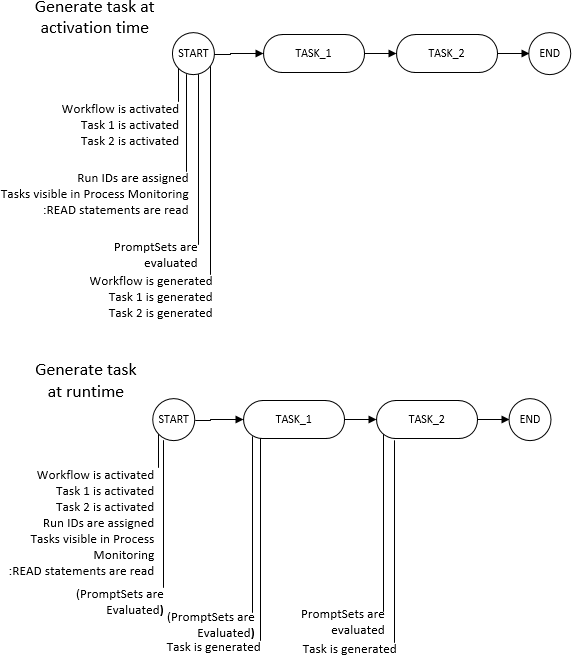Generating at Activation or at Runtime
Objects go through four stages when they execute. The first two stages, 1. Activation and 2. Generation (Runtime), prepare the object for execution. As a developer and object designer, you define when executable objects are generated on their Attributes Page. The options are Generate Task at Activation time or Generate Task at Runtime. In tasks within Workflows, you can also define some properties that affect their behavior in this respect.
For more information about the last two execution stages, see 3. Processing and 4. Completion.
Select this option if you want to generate the object at the end of the activation stage, immediately after all activation steps have finished. Consider the following implications when you select this option:
-
PromptSets (PRPT) and :READ statements are read at object activation. The Automic Web Interface displays them as requests that require user intervention during this stage.
Tips:
- Select Generate Task at Activation Time if you want users to provide input while the objects are executing.
- Design objects that trigger requests so that they pop up during working hours, otherwise they are blocked until a user takes care of them.
- All tasks in a Workflow activate one after the other when the Workflow is activated, in the sequence determined by the Workflow structure.
- Scripts start processing earlier. Early processing is an advantage when you have long scripts.
- Certain variables and VARA objects cannot be resolved yet because their values are available later in the process.
-
Tasks generate before the system performs the following evaluations:
- Workload of Agents
- Available Queue slots
- Maximum number of simultaneous executions that is allowed
Generate objects at activation time when you do not need to take advantage of the workload balancing capabilities of the Automation Engine.
Select this option if you want to generate the object immediately before the processing (execution) stage starts.
For stand-alone tasks without time dependencies, generation is usually close to the activation time. For objects that are children of other objects (for example, for tasks in a Workflow) there can be a substantial time difference.
-
Objects with PromptSets and :READ statements cannot finish their execution until the user reacts to the resulting request.
Tasks that run in a Workflow can have time dependencies (for example, an earliest start time).The request could pop up at a time in which user intervention is not possible.
- Scripts start processing later and can access more recent data.
- All variables and VARA objects can access the final values and can therefore be resolved.
-
The checks that are relevant for workload balancing and resources allocation take place right at the beginning of the generation stage. The script starts processing only after these checks have taken place.
Generate objects at runtime to take advantage of the workload balancing capabilities of the Automation Engine.
Task Generation in Workflows
If there are time dependencies for a task in a Workflow to start generating, the task activation time and its generation time deviate. Examples of such dependencies include breakpoints or earliest start times.
The exact time at which PromptSets are evaluated depends on what is selected in the task properties (General tab).
For more information on setting dependencies, see General Tab and Time & Dependencies.

See also:
- Executing Objects Overview
- Maximum Slots in Queue objects
- Sync Objects (SYNC)
- Workload Balancing - Distributing Workload among Agents
- Which Agent in the Group is Used?